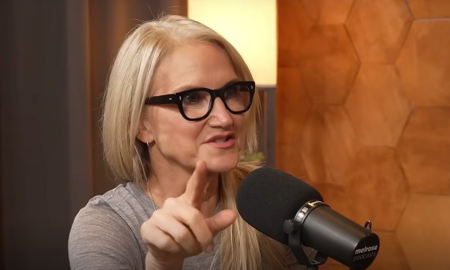The Truth About Health Tracking Apps and Their Impact on Wellness
Scroll through social media or browse the App Store, and you’ll likely spot dozens of health tracking apps. They promise everything—from better sleep to increased hydration and improved mood. Many people download them hoping to get healthy, stay organized, and track progress with minimal effort.
Dr. Don Grant, a media psychologist and advisor at Newport Healthcare, says the popularity makes sense. These applications give users easy-to-use tools for creating goals and keeping track of themselves. They give people a way to see measurable progress,” he explains. Whether tracking food, workouts, or sleep, they offer structure that many busy individuals crave.
But despite their growing appeal, it’s worth asking—do these tools always help? Or do they sometimes create unnecessary pressure?
How Health Apps Can Support Wellness

Freepik | gpointstudio | Health apps help people reach goals and notice small changes that support wellness.
When used thoughtfully, health tracking applications may encourage a strong sense of self-awareness. Many people report discovering habits or patterns they never noticed before. For example, tracking mood or energy levels alongside sleep or diet reveals how one impacts the other.
“These platforms help users notice trends,” says Dr. Grant. “By collecting daily health data, they figure out what supports or disrupts their wellness.” That data doesn’t just highlight trouble spots—it also shows improvements, which fuels motivation.
Users often appreciate how these apps support goal setting. Whether it’s walking 10,000 steps or drinking more water, having a visible target makes progress feel tangible. “Apps boost consistency and accountability, especially when goals are clearly measurable,” adds Dr. Grant.
Health professionals also point out that tracking early signs of decline can lead to faster interventions. Some apps notify users when sleep or heart rate patterns shift unexpectedly. That alert system may prompt action before small issues grow into larger concerns.
Where Things Start to Go Wrong
Even with clear benefits, tracking health can quickly become overwhelming. According to Dr. Grant, the risk increases when users link self-worth to daily numbers. “If people don’t hit their target steps or water intake, they may feel anxious or guilty,” he warns.
The stress builds further when users share results on social platforms. Public progress invites comparisons, which often lead to unrealistic standards. Instead of celebrating wins, people start chasing perfection—forgetting that health isn’t a competition.
And once that pressure takes hold, the original motivation begins to fade. “Missing a day’s goal can make some users feel like they’ve failed altogether,” Dr. Grant says. “That all-or-nothing mindset causes more people to quit.” What started as a way to improve wellness becomes another source of mental strain.
A Balanced Approach Makes the Difference
Freepik | Use health apps to support progress not perfection and listen to your own needs.
So, should you keep using a health tracking app? That depends on how it makes you feel. “Apps can absolutely inspire healthier routines,” says Dr. Grant. “They even assist clinicians in forming a clear picture of a patient’s lifestyle. But they must be used as guidance tools—not as judgment tools.”
Mindfulness matters here. Users who stay focused on gradual progress rather than perfection often see the best results. For people who tend toward over tracking or feel anxious around numbers, deleting the app—even temporarily—may provide relief.
That doesn’t mean abandoning your health goals. It just means shifting how you track them. Journaling or checking in weekly without relying on detailed stats can also support your growth. The goal is feeling better, not chasing flawless data every single day.
Health tracking apps work best when they empower—not overwhelm. They shine as supportive tools when used with awareness and flexibility. But once they shift from helpful to harmful, it’s okay to step back, reassess, and reset. After all, true wellness means progress that feels good—not pressure that drains you.
More in Motivation
-
`
Why Motivation Is Essential for Sustainable Fitness Success
Motivation isn’t something that shows up when it’s convenient—it’s something that needs to be built, shaped, and sustained. Many people struggling...
July 27, 2025 -
`
The Mystery of Human Body Parts That Science Still Can’t Solve
The human body is a patchwork of evolutionary choices, quirks, and mysteries. From skeletal structure to the tiniest gland, everything tells...
July 18, 2025 -
`
Why a Mediterranean Diet and Exercise Slow Bone Loss in Seniors
Bone health isn’t just a concern for the elderly—it’s something that starts to matter the moment the body begins to lose...
July 12, 2025 -
`
Want Better Memory? This Diet Could Help Keep Your Brain Sharp
Losing focus, memory lapses, or slower thinking—these aren’t just normal parts of aging. While cognitive changes do happen over time, lifestyle...
July 5, 2025 -
`
New Study Reveals Alzheimer’s Affects the Entire Body
Most people associate Alzheimer’s with memory loss and cognitive decline, assuming its impact stays confined to the brain. But new findings...
June 21, 2025 -
`
The One Simple Habit Mark Cuban Credits for His Success
Success doesn’t come from shortcuts or luck—it’s built on habits that stand the test of time. Mark Cuban, the outspoken billionaire,...
June 14, 2025 -
`
Thinking of a Detox Diet? Read This Before You Start
Detox diets continue to be one of the most talked-about trends in the wellness space. Whether it’s juice cleanses, tea plans,...
June 8, 2025 -
`
Feeling Drained by Others? Try the “Let Them” Method
Letting go isn’t just a poetic idea or a line in a famous song—it’s a mindset that can completely reshape the...
May 31, 2025 -
`
Caffeine in Blood May Influence Body Fat and Diabetes Risk, Study Finds
Caffeine is one of the most widely consumed substances worldwide, found in everything from coffee and tea to energy drinks and...
May 25, 2025










You must be logged in to post a comment Login